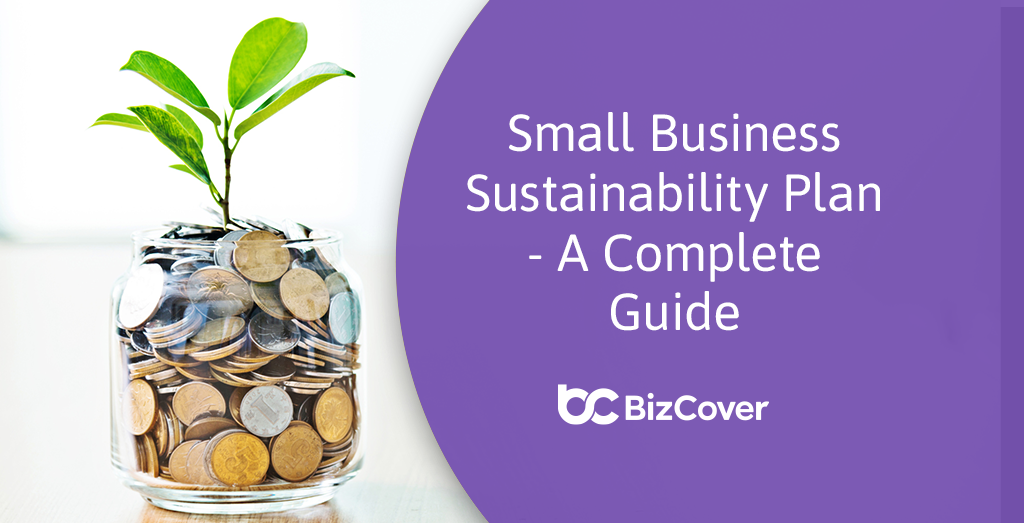How to set up your small business sustainability plan
Protecting our natural environment is a global challenge and we have an obligation to take care of it. Many small businesses are turning to more sustainable practices as a way to minimise their negative impact on the planet as well as improve their brand reputation.
A business sustainability plan is a document created by a company to help it achieve its operational goals while considering financial, environmental, and social sustainability issues.
Businesses that adopt environmentally safe practices can also promote profits, contrary to popular belief. Many companies around the world have found ways to increase their revenues while prioritising sustainable business practices.
The benefits of developing a sustainability plan
Regardless of the size of your business and the industry you serve, there are many benefits that can come with introducing a sustainability plan. These include cultivating respect amongst consumers and peers, as well as promoting environmental stewardship.
The benefits could include the following:
- Reduced energy consumption: By installing energy-efficient appliances and LED light bulbs, your business can reduce carbon emissions and save money.
- Promoting public health: a reduction in emissions and improved air quality can lead to higher standards of public health and general wellbeing.
- Attracting new customers: businesses that create sustainability plans are more likely to attract environmentally conscious customers. This can be a great way to improve your brand’s reputation.
Recommended reading: How to Make a Business More Sustainable
5 Steps to write sustainability plan
Here are five simple steps that can help you create an effective business sustainability plan for your small business.
Step 1. Increase your sustainability knowledge and awareness
Business sustainability plans are more than just making green decisions, they also consider the long-term effects of your business decisions and processes. This may require a change in perspective to consider the economy, households, and business practices in a different light. You can find plenty of sustainability information and research online from reputable organisations and government bodies.
Step 2. Assess your current business practices
Next, identify areas in your business where improvements can be made. This may include scrutinising your supply chain as well as thinking about your business operations. Are your products made using sustainable materials? What type of energy is used to power your building? Do your employees drive a petrol car to work?
Step 3. Identify the opportunities
To create a sustainable business plan you will need creativity and innovation to identify new ways to lower your waste and your energy consumption. Examples of such innovation could include incorporating new digital technologies to reduce paper, switching to plastic-free packaging, or introducing compost bins in the communal kitchen for your employees.
Step 4. Create your objectives
It is impossible for any one business to address every global sustainability issues simultaneously. Rather, it’s about starting small and changing what you can change right now. Choose one or two areas in which your business can have a positive impact.
It is important to provide details to your team, and any other relevant stakeholders such as investors about the sustainability plan that your company will adopt. This will help others understand their individual responsibilities for achieving the organisation’s sustainability goals.
Step 5. Make the changes
Implementing the changes is the final step in creating your business sustainability plan. To measure the success of your sustainability initiatives, you may consider establishing and tracking metrics and key performance indicators.
It is also important that your business has the data on hand and readily accessible to back up its claims of being an environmentally conscious corporate citizen. This will help when it comes to publicising the success of your business sustainability plans – which may lead to media opportunities for your business.
Here are some areas in your business where you can look to make meaningful sustainability changes.
Energy
There are many ways you can reduce your energy consumption. You can replace traditional lighting with more energy-efficient LED lights or install lighting timers and sensors. Solar panels and biomass boilers are two other clean energy options you can use to generate your own electricity.
Office resources
If possible, go paperless. Instead of throwing away unwanted or unneeded stationery like folders, paper, staplers, and pens, you can reuse them or donate them to a local charity or school. This applies to all unwanted office furniture and IT equipment too. You can also look into where you can repair, upcycle, or purchase pre-loved items in an antique or charity shop.
Products and packaging
Are you using sustainable materials that are safe and healthy for the environment? Examine the impact of your manufacturing on the environment to find ways to improve it. You can, for instance, pledge to use recycled materials to package or create your products.
Supply chain
Ensure that all of your suppliers agree to your sustainability commitments and take action. You can reduce your carbon emissions by sourcing products locally and from the nearest source.
Transport
Which vehicles are you using for distribution and operations? You might consider replacing petrol or diesel cars with hybrid or electric vehicles. Encourage your employees to walk or cycle for short distances, while car sharing may also be an option if your staff are happy to travel together. Remote or hybrid working arrangements can also be efficient too, as it eliminates the daily commute.
Water
Installing motion sensor taps throughout your business premises can be a smart way to conserve water? Ensure that you and your staff only turn the tap on when it is necessary, and put up posters around the workplace to remind your guests and staff. Check for water leaks and fix them as soon as possible. If renting, you may ask the owner of your business premises if rainwater can be collected and stored for use on site.
Small business sustainability FAQs
What is small business sustainability?
Sustainable businesses are those that willingly choose to take sensible and appropriate steps to conserve natural resources and work with minimal impact on the environment, the community, and society at large.
Why are small businesses more sustainable?
Although small businesses may not be more sustainable by default, customer demand and reputational issues are the main reasons why they are determined to take concrete steps toward a more sustainable future. As such, sustainability initiatives can also make a small business a preferred destination for environmentally conscious customers.
Why does a business need a sustainability plan?
A sustainability plan can be essential for helping small businesses achieve their sustainability goals. A carefully considered sustainability plan will include goals and a realistic timeframe. It also provides a method to monitor and measure progress in addressing the selected environmental, governance, and social impacts.
How BizCover helps small businesses grow
While you are busy implementing your sustainability plan, let BizCover help you with your business insurance needs. At BizCover we make buying your business insurance faster and easier than ever before – and without the drama you may have endured in the past when buying your business insurance.
We provide a quick and easy online platform for small business owners throughout Australia to compare competitive business insurance quotes and purchase their business insurance in less than 10 minutes – and without any annoying paperwork.
Common types of business insurance that BizCover can help you with include:
Professional Indemnity insurance: Protects your business from losses arising out of acts, errors and omissions from a wide variety of services.
Business Insurance: An insurance package designed to provide cover for your business contents, stock, tools and commercial premises when an insured event occurs.
Public Liability insurance: Business insurance that protects you from claims and supports your profitability in the event of a cyber breach or attack.
Visit our dedicated online destination for small business insurance to compare competitive business insurance quotes for your small business, get covered in only 10 minutes, and get back to building your business. If you prefer to speak with us, you can reach our friendly team on 1300 920 867.
This information is general only and does not take into account your objectives, financial situation or needs. It should not be relied upon as advice. As with any insurance, cover will be subject to the terms, conditions and exclusions contained in the policy wording.
© 2024 BizCover Pty Limited, all rights reserved. ABN 68 127 707 975; AFSL 501769
ABN 68 127 707 975; AFSL 501769
This information is general only and does not take into account your objectives, financial situation or needs. It should not be relied upon as advice. As with any insurance, cover will be subject to the terms, conditions and exclusions contained in the policy wording. © 2025 BizCover Limited.





